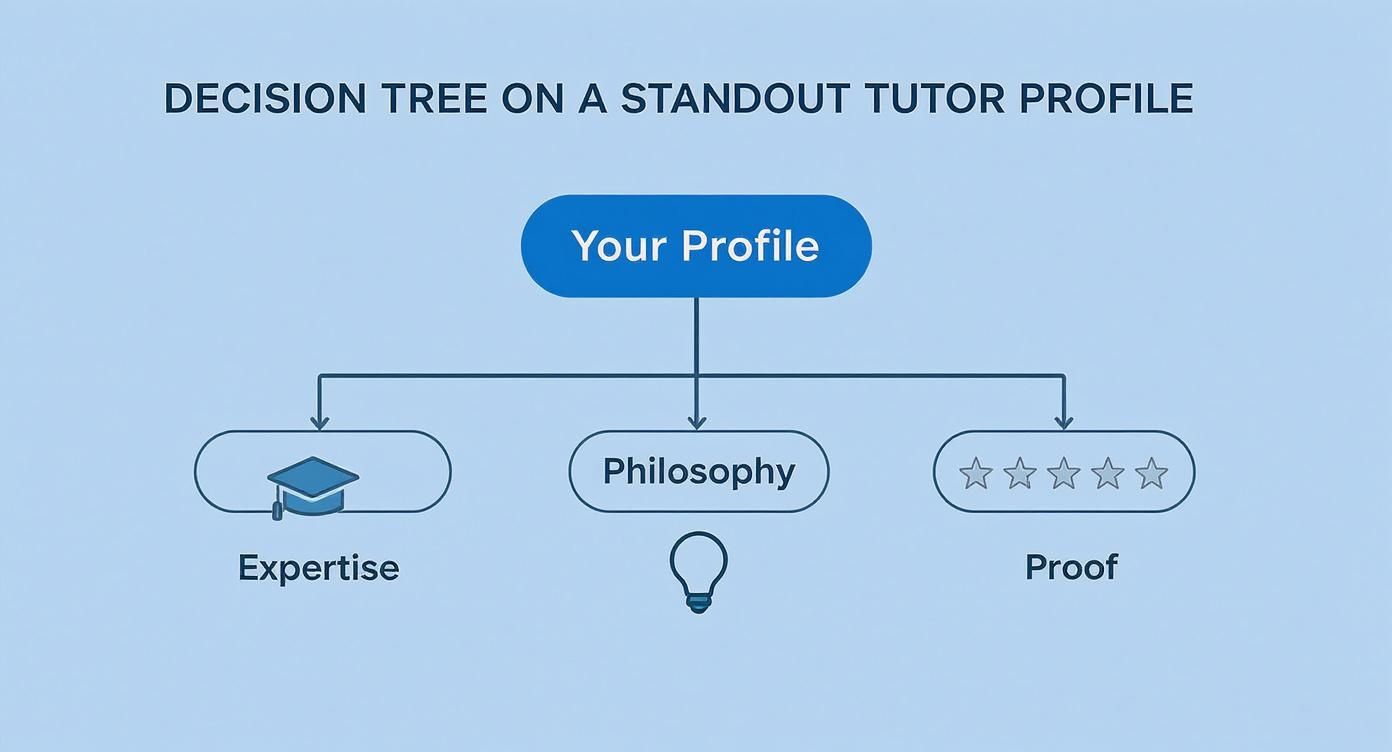Finding Tutor Online Jobs in Singapore
If you're looking for tutor online jobs here in Singapore, you're in the right place at the right time. The demand for personalised, flexible learning has shot through the roof, creating a fantastic opportunity for anyone with expertise to share—whether it's in Spanish or Secondary School science. The trick is knowing the local academic culture and using the right digital platforms to find your students.
Why Online Tutoring Is Booming in Singapore
Singapore's education scene has changed, and fast. What used to be a world of physical tuition centres and private home visits is now dominated by the convenience of virtual learning. This isn't just a fleeting trend; it's a real shift driven by what modern students and tutors actually need.
So, what's behind this growth? For one, Singapore's academic environment is famously competitive, and parents are always looking for an advantage for their kids. Online tutoring gives them instant access to subject matter experts without being limited by location. This is a game-changer for subjects like Spanish, where finding a great local tutor was once a serious headache. If you're going down the language route, our post on the benefits of a language exchange in Singapore might give you some fresh ideas.
The Economic Power of Tutoring
Let's talk numbers. The private tutoring industry in Singapore is a massive economic engine, valued at roughly S$1.4 billion. That figure alone shows you how much pressure there is to succeed academically and why so many families seek extra help.
For tutors, this translates into a real chance to earn a good income. Top-tier tutors can even command rates over S$200 per hour. This boom has created a clear pathway for anyone looking for tutor online jobs, whether as a side gig or a full-time profession.
The appeal for tutors is easy to see:
- Unmatched Flexibility: You call the shots. Set your own hours and work from anywhere with a decent internet connection.
- Wider Student Reach: Forget being limited to your neighbourhood. Online platforms connect you with students all over the island.
- Lower Overheads: No more commuting costs or renting a classroom. You get to keep more of what you earn.
A Realistic View of the Opportunity
While the potential is huge, jumping into online tutoring requires a smart approach. It’s not enough to just be an expert in your subject. You also have to be brilliant at engaging students through a screen and know how to market yourself effectively.
The real opportunity in online tutoring lies not just in teaching a subject, but in offering a personalised, supportive learning experience that traditional classroom settings often can't provide. It’s about becoming a mentor, not just an instructor.
This guide will give you a practical, no-fluff look at the opportunities out there. We'll walk you through actionable steps to find your footing in this busy market and build a rewarding online tutoring career.
Making Your Profile Pop in a Crowded Market
When you're looking for tutor online jobs, think of your online profile as your digital storefront. It’s your first impression, and frankly, it's often your only shot to convince a parent or a platform that you're the right person for the job. A bland list of qualifications just won’t do. Your profile needs to tell a story about who you are and the unique value you bring as a tutor.
Let’s be real: parents aren't just hiring a Spanish grammar expert. They're looking for someone they can trust with their child's education and confidence. Your profile has to build that trust from the first sentence, showing not just what you know, but who you are as a teacher.
Show Off Your Spanish Expertise
Just saying you're "fluent in Spanish" is the bare minimum. It tells potential clients nothing. You need to back it up with tangible proof and put your skills into a context they can understand. Frame your qualifications as direct benefits for their child.
- Put your qualifications to work. Don't just list your DELE C1 certificate. Explain what it means for the student. For example, mention that a C1 level means you can navigate complex academic topics, making you the perfect guide for a student tackling their IB exams.
- Lean into your unique experience. Did you spend a year studying abroad in Seville? Or maybe you worked for a company in Latin America? This isn't just a fun fact; it's a huge selling point. It shows you have a living, breathing knowledge of the language and its culture that goes way beyond textbooks.
Look at the difference. A weak profile says, "Spanish tutor with 5 years of experience." A strong one says, "For the last five years, I've specialised in helping students in Singaporean schools lift their IGCSE Spanish grades from a B to an A*. My knack is making tricky grammar finally click for English-speaking learners." See? Specifics sell.
Nail Down Your Teaching Philosophy
What makes you different from the dozens of other tutors out there? Your teaching philosophy. It’s your personal approach that shows parents you have a thoughtful, structured plan to help their child succeed. This is your chance to connect with them on a human level.
Your teaching philosophy isn't an academic essay. It's a clear, simple promise to parents about the learning experience their child will have. It’s about building confidence, not just listing pedagogical methods.
For example, you could say something like this: "My lessons are built around communicative learning. We skip the boring drills and jump into interactive conversations, so students start speaking real Spanish from day one. I believe confidence is the key to fluency, and I foster a supportive space where making mistakes is just part of the journey."
That kind of statement is clear, confident, and tells a parent exactly what to expect.
The Power of a Great Testimonial
Nothing builds credibility faster than social proof. Testimonials are golden endorsements that can be the single deciding factor for a parent scrolling through profiles. If you're serious about landing tutor online jobs, you absolutely need strong reviews.
Don't feel awkward about asking for them. The best time to reach out is right after a student has a big win, like acing an exam or showing a huge jump in confidence.
Here’s a simple way to ask for a testimonial that actually gets results:
- Be specific in your request. Instead of a vague, "Could you write a review?" try something more guided, like, "Would you be willing to share a few words about how our lessons have helped [Student's Name] with their confidence in conversational Spanish?"
- Make it incredibly easy. Send them a direct link to the review section on the platform or your website. The fewer clicks, the better.
- Showcase the best bits. Once you have a great review, pull out the most impactful line and feature it at the top of your profile. A quote like, "Maria didn't just teach my son Spanish; she taught him to love the language," is far more persuasive than any qualification you can list.
Choosing The Right Online Tutoring Platform
Sorting through dozens of sites for online tutoring jobs can feel like drinking from a firehose. Yet, this is more than a quick sign-up—it’s a partnership that can define your teaching brand and income.
You’ll want a platform whose student mix, tech tools and fee structure fit your style. Think of it as choosing the right classroom setup rather than just another job board.
Evaluating Platform Features
Before you commit, dig into what really matters on a daily basis. Here are the essentials to compare:
- Commission Structure: Platforms typically charge between 15% and 40%, or they might drop your rate as you accumulate hours.
- Student Demographics: Some sites serve parents searching for PSLE or IB help. Others attract busy adults keen to learn conversational skills for travel.
- Built-In Tools: A native whiteboard, recording feature or scheduling app can save you dozens of dollars each month on third-party subscriptions.
Mapping these features against your own teaching strengths helps you craft a profile that draws in the right learners.
Matching Platform To Your Teaching Style
Each platform has its own vibe when it comes to pairing tutors and students. Some operate like bustling marketplaces—you’ll actively pitch yourself to prospective clients. Others quietly match you via an algorithm based on your credentials.
The ideal platform feels like an extension of your brand. It should help you find your niche students and give you the tools to deliver standout lessons—beyond just handling payments.
Singapore’s tuition scene is fiercely competitive. With digital adoption surging, the Asia-Pacific private tutoring market is projected to climb from USD 48.55 billion to USD 92.56 billion by 2032. To dive deeper into those numbers, visit the online tutoring services market report from Straits Research.
At the end of the day, your decision hinges on how hands-on you want to be. If you love marketing yourself, a marketplace model might suit you. If you’d rather focus solely on teaching, look for platforms that match you automatically. Many tutors eventually build their own followings, inspired by established institutions like top language schools in Singapore.
Comparison Of Top Online Tutoring Platforms In Singapore
This table compares key features of popular tutoring platforms to help you choose the right one for your needs.
| Platform Name | Typical Commission Rate | Key Subjects | Best For |
|---|---|---|---|
| TutorBrand | 20% | Maths, Sciences | JC-level subject specialists |
| LinguaLive | 25% | Languages | Conversational language coaches |
| EduConnect | 15–30% | Academic Tutoring | Parents seeking exam preparation |
| SkillBridge | 18% | Professional Skills | Working professionals |
Use this snapshot as a quick reference when weighing each platform’s pros and cons. By matching their strengths to your teaching goals, you’ll set yourself up for a thriving online tutoring practice.
How to Ace Your Online Tutoring Interview
Getting the interview for tutor online jobs is a great first step. Now for the real test: proving you’re not just a Spanish expert, but someone who can actually connect with and teach students through a screen. This is your moment to show them what you've got.
Most interviews for these roles are a mix of a standard Q&A and a practical teaching demo. They're looking at everything—your personality, your teaching approach, and whether you’re technically set up for success.
Preparing for Common Questions
The interviewer wants to get inside your head as a teacher. They’ll ask questions designed to figure out how you manage different types of learners and what you do to keep them switched on and motivated.
You can almost guarantee you'll hear questions like:
- "What's your strategy for engaging a quiet or unresponsive student?"
- "Walk me through how you’d explain a really tricky grammar point."
- "In your opinion, what makes an online tutor truly effective?"
Avoid giving vague, textbook answers. The best way to respond is with real stories. Use the STAR method (Situation, Task, Action, Result) to give your answers substance. Talk about a specific student you worked with (Situation), the learning hurdle they faced (Task), the creative method you used to help them (Action), and the breakthrough they had (Result). This brings your experience to life.
If you’re feeling the pressure, professional guidance can be a game-changer. Sometimes working with an interview coach can help you polish your answers and feel more confident, especially when it comes to the mock lesson.
Delivering a Winning Mock Lesson
This is your time to shine. The mock lesson isn't about shoehorning a semester's worth of content into a ten-minute slot. It's about showing the interviewer you can create a learning space that’s interactive and encouraging, even through a webcam.
The goal here is to put your teaching philosophy into practice. If you say you’re all about student engagement, your demo needs to reflect that with plenty of questions and collaborative activities.
A great mock lesson feels less like a lecture and more like a collaborative discovery. The interviewer should walk away feeling like they've learned something and enjoyed the process, not like they've just been tested.
Here’s how to nail your teaching demonstration:
- Pick a focused topic. Don’t try to teach the entire subjunctive mood. Choose something small but important, like a practical use case for the difference between "ser" and "estar".
- Make it interactive. Get the interviewer involved. Use the platform’s whiteboard, ask them questions directly, and have a quick, simple activity ready.
- Watch the clock. Stick to the time you've been given. Ending your lesson on time is a huge sign of professionalism and shows you can plan a lesson effectively.
Your Tech Setup is Part of the Interview
Never, ever underestimate your tech. A dodgy internet connection, crackly audio, or a poorly lit video feed can completely undermine a brilliant interview. It immediately signals that you might not be equipped for the realities of tutor online jobs.
Do a full tech rehearsal beforehand. Check your camera, microphone, and internet speed. Make sure your background is tidy and professional, and that your face is well-lit. It seems like a small thing, but it shows you’re a serious candidate who understands the importance of presentation.
Essential Tools for Effective Online Teaching
Being a fantastic Spanish tutor is about more than just your language skills. To really shine in the world of tutor online jobs, you need to create a virtual classroom that's just as effective as a real one. It all starts with your tech toolkit. The right gear can turn a simple video call into a truly engaging and interactive learning space.
Your setup doesn't need to break the bank, but it absolutely must be reliable. A choppy internet connection or a crackly microphone can derail a lesson in an instant, completely breaking your student's concentration. Think of these tools as the foundation of your online teaching career—an investment you can't afford to skip.
Your Core Tech Setup
Before you even think about your first lesson, let’s get the non-negotiables sorted. Nailing these basics is the bedrock of a professional online practice and will save you from most technical glitches down the line.
- A Solid Internet Connection: This one’s critical. A stable, high-speed connection is a must. You should aim for an upload speed of at least 10 Mbps to handle video streaming and screen sharing without any frustrating lag.
- A Quality Headset with a Microphone: Honestly, this is a game-changer. A dedicated headset with a noise-cancelling mic means your student hears you, not the dog barking next door. Clear audio is non-negotiable.
- Good Lighting and a Simple Background: You don't need a professional film studio. Just make sure your face is well-lit from the front. A clean, uncluttered background behind you looks professional and keeps the focus where it should be—on the lesson.
Remember, your tech setup is the first impression you make in every single lesson. A professional and reliable virtual environment builds immediate trust and shows students you take their learning seriously.
Essential Software and Teaching Aids
Once your hardware is in place, it’s time to look at the software that will bring your Spanish lessons to life. While many tutoring platforms come with their own built-in tools, having a few of your own favourites ready gives you much more flexibility.
A digital whiteboard is indispensable for explaining concepts visually. How else can you easily break down Spanish verb conjugations? Tools like Miro or even the simple annotation features in Zoom let you write, draw, and collaborate with your students in real-time, just like you would on a physical whiteboard.
Screen-sharing will also quickly become your best friend. It’s perfect for walking through exercises, looking at a PDF of homework together, or exploring online resources. Beyond the software itself, understanding and applying key online education best practices is what truly separates a good lesson from a great one.
These digital teaching techniques aren't just for Spanish, of course. We explore similar strategies for language learning in our guide on how to improve in Chinese, where many of the same principles of engagement and feedback are key. The goal is always to create a dynamic learning environment where students feel actively involved, not just like they're passively watching a screen.
Common Questions About Online Tutoring Jobs
As you start thinking about becoming an online tutor, you're bound to have some questions. I get asked the same things all the time by new tutors, so I've put together some straight answers to help you get started on the right foot.
Let's get the big one out of the way first: money.
How Much Can I Realistically Earn?
Honestly, your hourly rate for online tutoring jobs in Singapore can vary quite a bit. It really depends on your experience, what you teach, and the level of your students. If you're just starting out, you can expect to be in the S$20-S$30 per hour range.
But if you're an experienced tutor with a great track record, especially in high-demand subjects like JC-level Maths or Sciences, you could be looking at S$50-S$80 per hour, sometimes even more. Just don't forget that tutoring platforms take a cut. Their commission fees can be anywhere from 15% to 40%, so you need to factor that into your pricing.
Do I Need Formal Teaching Qualifications?
Look, having a formal qualification like a diploma from the National Institute of Education (NIE) is a fantastic bonus, but it's not always a deal-breaker. For many platforms and private clients, having a university degree in your subject is more than enough to get your foot in the door.
At the end of the day, what really counts is proving you know your stuff and can actually teach it well.
The most convincing qualification is often a track record of student success. Positive testimonials and prior tutoring experience, even if informal, can easily outweigh the absence of a formal teaching certificate in the eyes of a parent.
How Can I Find Private Students?
If you decide to go it alone and find your own students, you'll need to do a bit of self-marketing. First things first, build a solid online presence. A professional LinkedIn profile or even a simple website that shows off your expertise and lists your services is a great place to start.
Then, you need to connect with people directly. Here’s what works:
- Join relevant online communities: Get active in Singapore-based parenting forums or Facebook groups where parents are looking for tutors.
- Leverage your network: Good old-fashioned word-of-mouth is still incredibly powerful. Tell your friends, family, and colleagues you’re available for tutoring.
- Offer a trial lesson: A free 20-minute introductory session is a brilliant way to build rapport and show a potential client what you can do. Let your teaching speak for itself.
What Are the Most In-Demand Subjects?
In Singapore's academic environment, the demand for online tutoring jobs is always highest for the core curriculum subjects. Maths and Sciences (especially Physics and Chemistry) for Secondary and Junior College (JC) students are always hot tickets.
English language prep for big exams like the PSLE and O-Levels is another area that's constantly in demand. And for students gearing up for their A-Levels, tutors for General Paper (GP) and Economics are also highly sought after.
Ready to turn your Spanish expertise into a rewarding career? At Spanish Council Singapore, we offer structured courses and support for aspiring teachers and learners alike. Discover how our community can help you achieve your goals. Find your perfect Spanish class with us today!
















